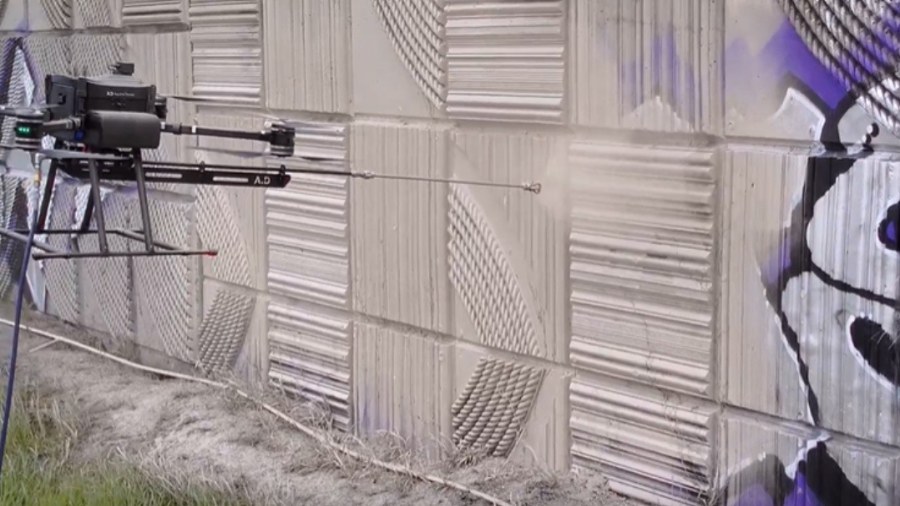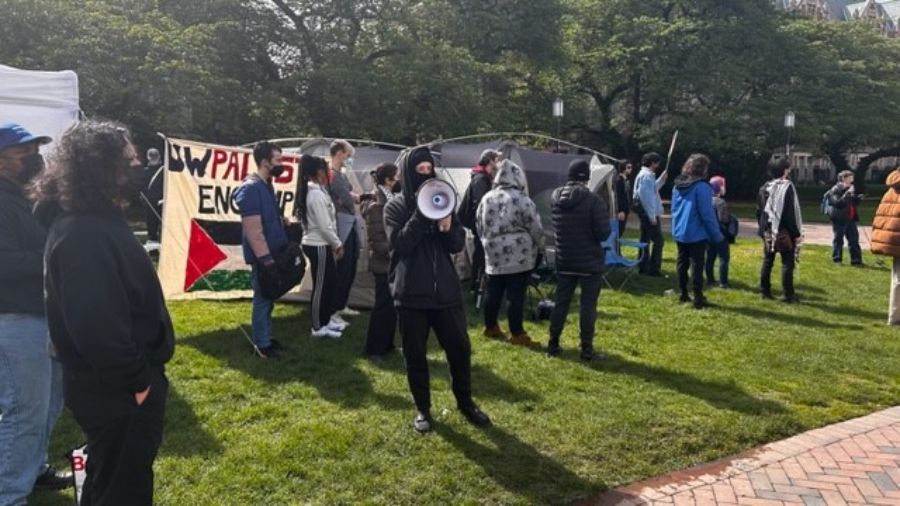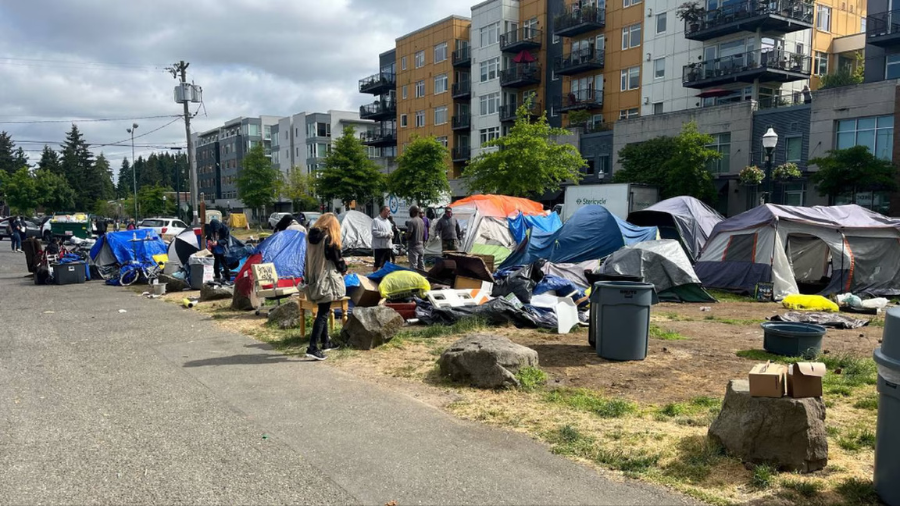In Plain Sight: Criticisms, questions raised about controversial nonprofit We Heart Seattle
Apr 8, 2024, 3:38 PM | Updated: 3:57 pm
This KIRO Newsradio exclusive video, In Plain Sight, is from reporter Sam Campbell and covers the nonprofit organization We Heart Seattle. Above is the entire documentary. Keep reading for the whole story. Links to the three parts as they ran previously also are available in this story.
In a soggy greenspace tucked between Dexter and 4th Avenue in Seattle, a team of volunteers find footing on a muddy embankment, grabbing onto tree branches for support as they walk deeper into the small roadside wooded area toward the remnants of a small encampment.
They gather cushions, tents, books, needles, blankets and keepsakes.
This was the scene at the city’s parcel of land in late January when the team returned to finish cleaning up the camp. Their initial cleanup two weeks prior was interrupted by a grim discovery – the volunteers stumbled upon the decaying remains of a person, presumably, who lived in the camp.
More on the discovered human remains: Volunteer group finds human remains in Seattle park
“I was checking in on the camps that were still set up, and I happened to come across a fully decomposed body,” Kodi Pickett, a volunteer who found the human remains, said. “It was lying in a tent. It was all fully clothed, wrapped in a blanket when I pulled it out.
“It was a real shock to me. I’ve seen a lot of bodies in my time, but seeing one fully decomposed …” Pickett continued as he trailed off.
Volunteers called the Seattle Police Department (SPD) to report the death. Officers responded and the bones are now being examined. With the fluid nature of homeless camp populations, and no definitive head count on this camp from any official organization, questions remain on just how many people lived here, who knew this person and who knows what happened to them.
At the time of this publication, there’s no available identification yet from the King County Medical Examiner, leaving a mystery on how this person died and who they were.
In Plain Sight Part 1: How controversial nonprofit We Heart Seattle uncovered human remains
In Plain Sight Part 2: Critics claim We Heart Seattle destroys homeless peoples’ property
In Plain Sight Part 3: Questions surround We Heart Seattle, King County policies
Lack of certainty leads to more questions
The uncertainty has left some, like the volunteers, scratching their heads. They’ve seen the remains — forgotten, long enough to decompose down the bone — and they ask questions like, “How many more will be found like this person?”
Enter We Heart Seattle (WHS), whose volunteers were the ones to find the person’s decaying bones.
In the absence of concrete answers from the city and county, volunteers acted as amateur detectives at the site — piecing together what they can through the debris. Among their findings are glass bottles strung up on branches like ornaments, a veritable library of novels and enough needles to fill multiple biohazard containers.
The volunteers concluded, in their amateur assessment, this person was likely a voracious reader with an unbroken taste for décor and a crippling intravenous drug addiction.
“This is somebody who has a lot of trauma. I don’t believe they were one paycheck away from making their rent from getting fired from Boeing or wherever,” WHS Founder Andrea Suarez said. “Addiction gets the best of people. They’re in a cycle. There’s no way a person chooses this way and stays out here to languish and eventually die if drugs are not involved. And the evidence is clear.”

SPD officers and We Heart Seattle volunteers search through an encampment where human remains were uncovered. (Photo courtesy of We Heart Seattle)
Suarez founded WHS during the COVID-19 pandemic. As the nonprofit’s executive director, she leads a handful of staff and rotating teams of volunteers in an “action-based, boots-on-the-ground movement that organizes trash cleanups in our public spaces and offers resources to those in need,” the organization’s website states.
“We’ve been doing this for three years. This is our 330th trash pick,” Suarez said. “Over a million pounds of trash has been removed in green spaces and encampments in three years with over 11,000 hours of volunteer, boots-on-the-ground labor.”
While WHS found the remains during what the group calls a “trash pick,” it took place at a homeless encampment and it remains unclear if anyone was currently living in the camp at the time the bones were found. It has raised questions among volunteers as to why they were the ones – and not city crews – to find the remains. Among other Seattleites, the discovery raises concerns a nonprofit without proper training is entering homeless encampments – even though they are often located on public land, as this camp was.
Who is We Heart Seattle accountable to?
As a private organization operating on public land, some ask who WHS is accountable to. KIRO Newsradio has worked to find that answer.
WHS isn’t officially contracted with any city or government agency. The Office of Settle Mayor Bruce Harrell, King County Regional Homelessness Authority (KCRHA) and Washington Department of Transportation (WSDOT) have all said they do not coordinate with Suarez’s organization.
Callie Craighead, a communications associate with Harrell’s office, sent the following response by email to KIRO Newsradio.
The City does not have any active contracts with We Heart Seattle. We would defer to the King County Regional Homelessness Authority (KCRHA) if they had any contracts for outreach or other services.
Volunteer clean ups at parks can be authorized by Seattle Parks & Recreation (SPR), but at this time this organization is not a registered volunteer group with SPR’s volunteer unit.
We Heart Seattle hosted a volunteer event for the One Seattle Day of Service in 2023, but no direct funding from the City is provided for this event.
James Poling of WSDOT also confirmed to KIRO Newsradio they are not working with We Heart Seattle.
“WSDOT has not any direct coordination with We Heart Seattle,” Poling said in an email.
Finally, Anne Martens of the KCRHA stated in an email her organization does not have an official relationship with WHS.
“We Heart Seattle has a number of dedicated staff and volunteers, but they are not a contracted service provider,” Martens said.
Instead, the nonprofit relies solely on donations, which Suarez estimated is in the $700,000 range this fiscal year. In terms of relationships with local leaders, Suarez previously told “Seattle’s Morning News” she viewed her actions cleaning up camps as “disruptive” to the status quo.
“They’re like in an archeological dig site picking up trash from 5, 6, 10-plus years ago. It could be part illegal dumping, part accumulated trash by the people living there,” Suarez said as she described what the volunteers were doing at the site. “Thousands upon thousands upon thousands of used needles, cookers, tourniquets and other drug paraphernalia that King County hands out with the needle-exchange program. I do question what the term ‘exchange’ is in that failing program that is really just enabling people to die out here alone.”
But with five of nine Seattle City council members new on the job, Suarez said she’s experienced a change in her interactions with some of them, including some city council members actually joining their “cleanups.”
More on the “new” Seattle City Council: Sara Nelson named Seattle City Council president; 5 new members sworn in
“Our city attorney has been out here litter picking. Ann Davison, Sara Nelson, Rob Saka, Cathy Moore. Bob Kettle came out to an event. I feel very hopeful that we now have a council that supports private-funded collaborative efforts that are helping guide them on what working and what’s not and giving a voice to addicts.”
Unlike service providers contracted through the KCRHA, she’s said she thinks drug treatment for people suffering from addiction should come before housing.
“The current housing-first funding doesn’t give money to people who are trying to give people a hand up and a path out of addiction, so We Heart Seattle is using a lot of our donations to fund recovery-oriented housing,” Suarez said.
Refusing to commit to prioritizing housing first has historically left her out of broad homelessness outreach coordination in the county. It’s also earned her and We Heart Seattle a contested reputation as either a maverick or a renegade — depending on the person’s views. But it’s a reputation that Suarez has embraced.
“Now the motto is, ‘don’t talk to homeless about addiction or recovery and don’t go knocking on their door, they don’t knock on your door’ and I say, ‘well, isn’t that the exact definition of stigmatizing? To not acknowledge the person as a human being? That they too might want a clean house? They too might want a clean and sober pathway out?’ So for that, I say, ‘Let’s knock on those tent doors, go within 20 feet, do a welfare check.’ All hands on deck. Everyone can be an outreach worker.”
Suarez’s claim anyone can work in outreach has garnered widespread criticism among homelessness advocates in Seattle.
Critics claim We Heart Seattle destroys homeless peoples’ property
During its three-year run, We Heart Seattle’s “boots-on-the-ground” approach has gained the nonprofit much attention — but much of it is highly critical. Search engine results of the nonprofit’s name led to countless accusations across multiple social media platforms.
The posts accuse We WHS of lying to people living in the camps about who they are, destroying the belongings of homeless people without asking permission, and more allegedly unethical behavior.
The scathing entries come from critics as well as those purporting to be close to homeless people WHS has interacted with.
An entire website is dedicated to documenting alleged misdeeds of WHS called “We Heart Seattle Exposed.”
William Hughes, known independently from the websites and social media, spoke to KIRO Newsradio about his encounters with WHS. Hughes previously lived under the Ship Canal Bridge for two years. He said he has run into Suarez and We Heart Seattle volunteers at multiple camps.
“She walks by this one tent and she goes, ‘Wow, that tent is — ‘ and (she) just steps on it, and says, ‘Yeah, that’s trash,” Hughes said, recalling one purported incident with Suarez and her volunteers at a camp. “It was our friend’s tent. He wasn’t there for a couple of days because he had to go do some things. But he lived there, and his stuff was in there. And she said, ‘Looks like trash to me.'”
Comparing WHS to JustCare, an outreach and shelter program supported by King County, Hughes said the difference is JustCare has a level of accountability intrinsic to their cooperation with local government.
‘No one is a trained social worker:’ WHS’ lack of formal training raises concerns
It’s the same lack of affiliation and cooperation that worries some advocates and activists.
“When REACH and LEAD will go out and do — when they’ll go out and do outreach, these are trained social workers that are also, you know, they’re also coming along, so they have the training and knowledge to make that harm less impactful,” said Mutual Aid worker and activist Alycia Ramirez, an outspoken critic of the nonprofit.
REACH is an outreach team led by Evergreen Treatment Services. LEAD diverts low-level drug offenders into treatment, often away from jail time.
“I don’t think anyone on Andrea’s board, including Andrea herself, has any prior experience with that. No one is a trained social worker,” Ramirez added. “There are some things that you can do that you don’t necessarily need to go to college and get a degree for. But with casework especially, it’s not just something you can go around and say, ‘I’m a social worker’ or ‘I’m a case worker,’ and that has happened in the past.”
Fellow Mutual Aid worker and activist Aiden Carroll noted how much time outreach workers need to spend to demonstrate that their intentions are real and not malicious.
“I know outreach workers have to spend a lot of effort, in some cases demonstrating that they’re sincere,” Carroll said. “It’s a real issue. It’s creating more barriers.”
Suarez claims she chooses camps to target for cleanups and then does “welfare checks.” KIRO Newsradio asked about the visits and her credentials.
“We are caseworkers. Tim and I are caseworkers. We’ve been doing this for three and a half years,” Suarez said. “We’ve been through trauma-informed care training, de-escalation training, on-the-job training. My educators are the 200 people and the thousands of homeless that we’ve met right here on the slopes that have said, ‘You guys are game changers.'”
More on We Heart Seattle: Volunteer group says it has cleared 1 million pounds of trash in Seattle camps
When asked by KIRO Newsradio if she had any official licensing from the state or anywhere else, her response shifted the conversation in a different direction.
“I don’t know, did Jesus Christ have a license?” Suarez said.
Hughes, a Christian, disputed Suarez’s characterization, saying “Jesus wouldn’t do the things I’ve seen her do.”
YouthCare Center confronts Suarez after case manager claim
The topic of whether Suarez maintained proper credentials to identify herself as a case worker came up in March 2021 at the YouthCare Orion Center in Seattle, which provides services to homeless young people.
YouthCare Director of Marketing Pascha Scott spoke with KIRO Newsradio about the incident.
“A woman came to the rain center one evening, knocked on the door. And the staff on site that evening, let her in. And she said she was a young person’s case manager identifying that young person by name. At that point, the staff asked that she identify herself and her agency. She said she was Andrea Suarez with We Heart Seattle … She was not known to the staff as a caseworker (or) as a case manager,” Scott said, recounting an incident report filed by staff at the time.
Scott stated case management is an internal service provided at Orion Center. When Suarez allegedly asked about one of their young clients by name, the staff asked to her stand outside to protect the privacy of other young clients.
According to Scott, Suarez took that to mean she was being kicked out. After the publication of In Plain Sight, Suarez said the incident happened in 2020, but did not dispute the details from Scott.
When asked about other accusations and criticisms of WHS, Suarez dismisses them either as exaggerations or lies.
“It’s manufactured controversy on some random website,” Suarez said. “Even people who are out out here living rough (say) ‘I read that and it’s like, yeah, some woman has it after you.'”
“It’s just a middle school playground set of accusations that has nothing to do with the real work we’re doing,” she added. “Anybody that comes out here and volunteers from us — if anything, thank you for the publicity haters, because, you know, no good deed goes unpunished. And if you’re not out here with us, then you have no right having any opinion there or otherwise about what we’re doing.”
Suarez continued to dispute the claims, instead highlighting charitable work she said WHS has accomplished.
“We’ve saved lives. We’ve created lives. We’ve created jobs. We’ve restored green spaces,” Suarez said. “Frankly, I think we have become unassailable, and they’ve quieted way down.”
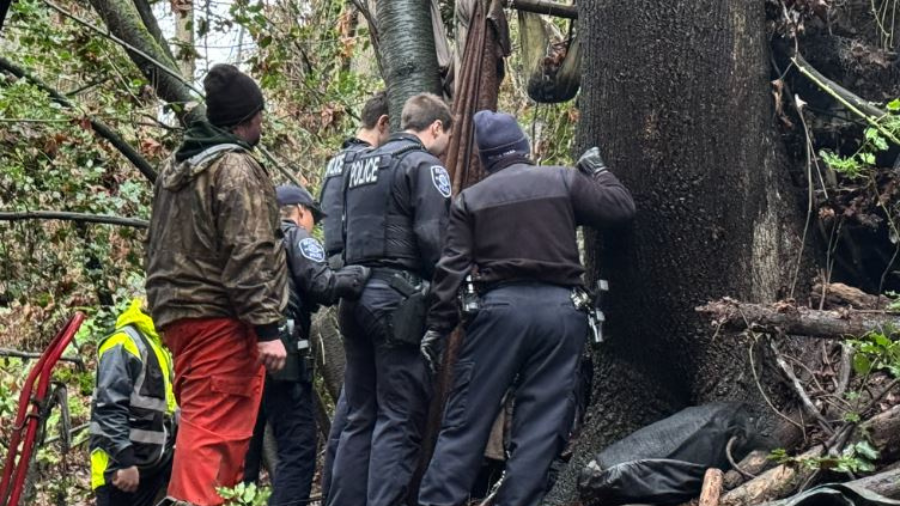
SPD officers and We Heart Seattle staff search through an encampment where human remains were uncovered. (Photo courtesy of We Heart Seattle)
Suarez fires back at website critical of WHS
Since that interview, Suarez sent in additional comments to KIRO Newsradio responding to the allegations. She disputes the validity of the highly critical website, We Heart Seattle Exposed.
She points out its lack of bylines with each article posted. In fact, the site doesn’t list the author of every post, only occasionally mentioning the first names of people purportedly involved. Its only official attribution is at the bottom of the page — an apparent copyright for a group named Concerned Citizens Against We Heart Seattle 2023.
Domain registry searches do not show the name of the site’s registrant, listing it and any administrator as “redacted for privacy.”
The real identity of the authors of We Heart Seattle Exposed remains unknown to KIRO Newsradio at the time of this publication.
More from Sam Campbell: Burien City Council member confronts homeless outside condo
The response from Suarez continued, saying WHS is made of “everyday citizens in volunteer groups” that “are making a positive daily impact.” Suarez said they are “taking action to support the city even when sometimes there is opposition that doesn’t always see things the way we do.”
Critics maintain their distrust of We Heart Seattle, with some pointing to an official criminal case against a former board president of WHS. KIRO Newsradio examined the charges and heard from a homeless man who now volunteers with the nonprofit, saying WHS picked him up out of despair.
Questions surround We Heart Seattle, King County policies
While Andrea Suarez and her nonprofit We Heart Seattle (WHS) defend themselves from accusations of theft and impropriety, a man who formerly served as their board president defends against 19 criminal counts in Oregon.
Kevin Dahlgren, who has created a social media following centered around documenting the living conditions of homeless people, is now facing charges for allegedly stealing the identities of homeless people near Portland, Oregon.
Court documents indicate he was working as a homeless services specialist for the City of Gresham, Oregon, at the time.
More on Kevin Dahlgren: Former president of PNW homeless outreach group charged with identity theft
Dahlgren is also listed in WHS’ tax documents as having been paid nearly $30,000 for “consulting” fees in 2022. He was paid around $5,300 the year before, according to 2021 filings. Suarez said he had limited involvement with her organization.
“He has 20-plus years in the field. But there’s not any reason to believe that he took or stole or committed any crime while you know, on the clock, so to speak with We Heart Seattle here in Seattle,” Suarez said. “And we’re heartbroken for anybody harmed and wish him the best path out that’s fair and equitable for all.”
In comments sent after KIRO Newsradio’s interview with her, Suarez addressed Dahlgren’s case.
“We paid him professional services because of the two decades of clinical experience he had, and helping us professionalize our organization in terms of the outreach piece as he is a drug and alcohol counselor,” Suarez wrote. “Whatever hot water he is in with the City of Gresham has absolutely nothing to do with us and are blind-sided by the news.”
DJ Ziegler: We Heart Seattle put me ‘back on track’
While criticism of WHS and its tactics colors much of the conversation surrounding the group online, the group closest to Suarez includes avid supporters of her character.
DJ Ziegler used to be homeless. It’s how he met Suarez and the nonprofit. Now, he volunteers to help pick up debris at their visits to homeless camps.
“I know that Andrea accepted me as I am at that time, and she didn’t put a bunch of stipulations on me. She didn’t have a bunch of expectations,” Ziegler said. “She just gave me that taste of that work ethic that I so much craved.”
He said she offered him a “stipend” to work with her team moving his things, but he couldn’t recall the value of it when asked. After working with Suarez and WHS, Ziegler later checked himself in with authorities on an outstanding warrant before going to detox for meth addiction.
Ziegler says without Suarez and WHS, he doesn’t know if he’d have done the same.
“The nice thing is the (trash) picks are only two or three or four hours. So it’s just a taste of enough to get you on track,” Ziegler said. “And then, that two hours turns into four hours turns into six hours that I’m able to actually work or function. So in the beginning, it was two hours or three hours every Saturday. And that was just enough to be able to start a process and get me back on track.”
Suarez told KIRO Newsradio her nonprofit paid $6,000 each to Ziegler and fellow volunteer Kodi Pickett for recovery-oriented housing after a “30-day inpatient” stay.
City relationship with We Heart Seattle appears to shift
WHS does not embrace the Housing First model of homelessness outreach that has characterized policy in King County, and it has led to criticisms, like those In Plain Sight covered in Part 2 of the series. The same difference in opinions over policy has led to We Heart Seattle being kept at arm’s length, away from close coordination with the City of Seattle and the county.
Suarez contended she and others in her organization are forgoing the established norm, going against the grain for a good cause — one of few entities in the so-called homelessness-industrial complex that she believes are carrying out meaningful action — without the burden of dogma.
She has cast doubt on the efficacy of agencies, local governments and organizations, like the King County Regional Homelessness Authority and the City of Seattle, which formerly homeless people tell KIRO Newsradio were helpful to them.
But the relationship between the nonprofit and the city appears to be changing, with local leaders embracing the once-ostracized group. While previous city leaders kept the organization at arm’s length, Suarez told KIRO Newsradio several newly elected city councilmembers and the city attorney have all attended WHS’ “litter picking” events.
“Our city attorney has been out here litter picking, Ann Davison,” Suarez said. “Sara Nelson, Rob Saka, Cathy Moore, Bob Kettle came out to an event. I feel very hopeful that we now have a council that supports private-funded collaborative efforts that are helping guide them on what working and what’s not and giving a voice to addicts.”
In a committee meeting March 27, Seattle Parks and Recreation (SPR) Chief of Staff Christopher Williams told the council “we love” Suarez’s nonprofit.
“They do great work,” he said. “We have tried to maintain an open communicative relationship with them. When they are doing cleans, we will frequently take dump runs of debris to the dump. We try to facilitate their work as much as we can within the standards of our UCT team requirements for how we work with encampments and remove debris.”
“They’re a force to be reckoned with, and we appreciate everything they do across the system. We have a good partnership with Andrea,” he said.
The remarks came about several weeks after a spokesperson with Mayor Bruce Harrell’s office told KIRO Newsradio that the city has “no active contracts” with WHS. The mayor’s office indicated at the time that WHS was also not a registered volunteer group with SPR.
For now, it remains unclear if SPR’s recent comments, or the councilmembers purported participation with WHS, represent any upcoming shift in city policies.
KIRO Newsradio has reached out to Councilmembers Moore, Saka, Kettle and Council President Nelson for an interview.
An uncertain future
Suarez and WHS continue their work cleaning public parks, and critics of the nonprofit call WHS’ approach reckless, saying the nonprofit’s approach only worsens trust-building with homeless communities in the long term.
The most outspoken critics point to WHS’ lack of affiliation with a governmental body as a problem: They say that without it, any attempt for accountability in any of the nonprofit’s alleged misdeeds will go unheard.
While that argument continues, heated discord itself remains one of many factors strangling conversations around homelessness in Seattle — with local, county and state officials sometimes debating who has jurisdictional authority over a piece of land before anyone is offered housing or swept from the area. Housing conditions and how much funding — along with where it goes — remain a sticking point, too.
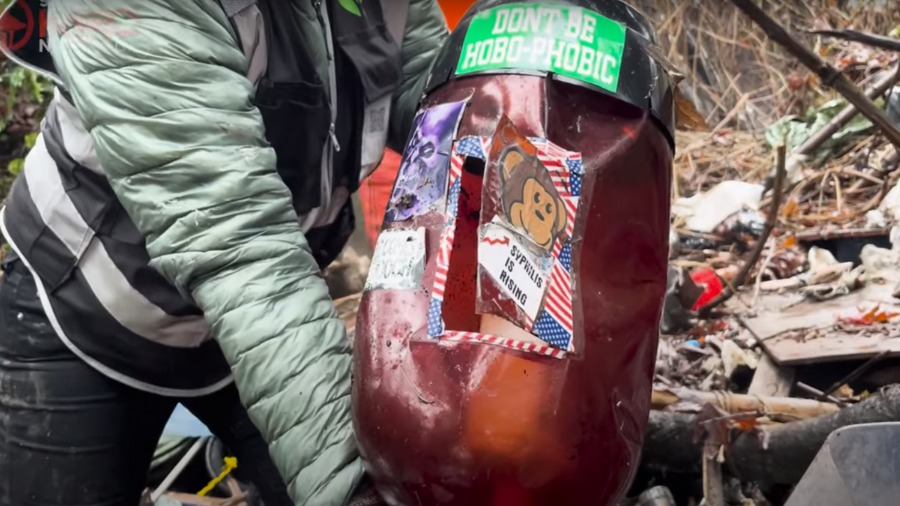
Andrea Suarez, founder of We Heart Seattle, holds a canister with a “Don’t be hobo-phobic” sticker during a homeless encampment cleanup in January 2024. (Image captured by Sam Campbell, KIRO Newsradio)
In the City of Burien, council members debated for several months what to do with a $1 million offer from King County to help with homelessness. They debated until the funding’s deadline almost expired, the money along with it. Burien ultimately agreed to accept the money, but at the time of publication, that money is locked in ongoing debates over where the city will use it to build a tiny home village.
Meanwhile, people have died outside.
Data from the King County Medical Examiner’s Office shows 421 people died while homeless in 2023 – with the cause for 74% listed as accidental drug overdose or poisoning.
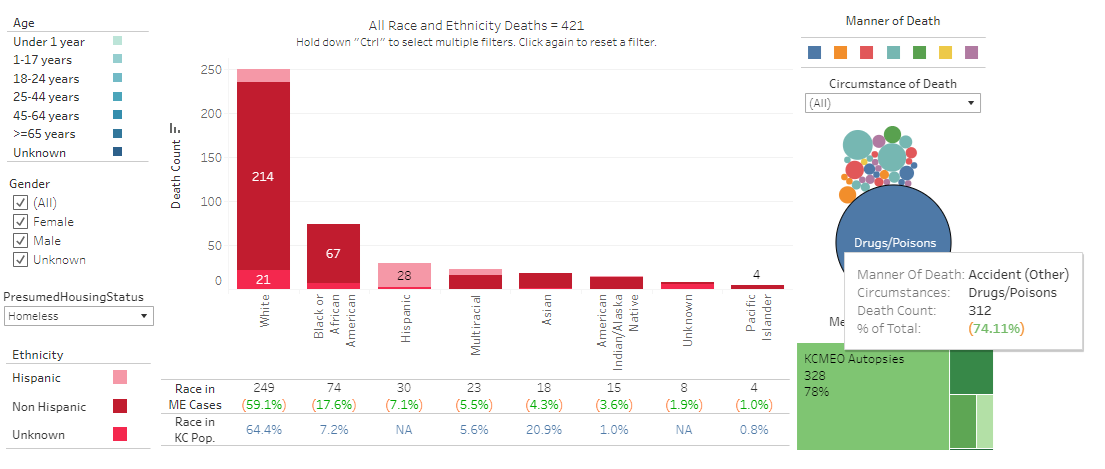
Data from the King County Medical Examiner’s Office shows 421 people died while homeless in 2023 (Graphic provided by the King County Medical Examiner’s Office)
And it has gotten worse. In 2022, the medical examiner recorded 309 deaths of people who were homeless. In 2021, 188 deaths, when numbers show drug and poison accounted for just 43 percent.

Data from the King County Medical Examiner’s Office shows 188 people died while homeless in 2021. (Graphic provided by the King County Medical Examiner’s Office)
In an interview after human remains were found on the greenspace along Dexter Avenue, William Hughes, who lived under the Ship Canal Bridge for two years, said he has seen too much death. But he endures, looking for a way out — as do thousands of people around King County.
Hughes, who is now living in a tiny home, said he has searched for those he can trust to help him — out of the trenches of homelessness and the ideological crossfire surrounding it. But he admits, the arguments surrounding homelessness, including the unethical behavior he accuses of WHS, tires him.
When asked if he tried to turn the other cheek, Hughes sighed and offered a pointed response.
“They’re getting thin, bro. But I kind of have to — I have to be lenient and I have to understand everybody’s at a different (point of view),” he said.
Why did Seattle crews not find a decomposing corpse?
Despite the accusations and doubt cast on WHS’ ethics, the fact remains its volunteers were the ones to find the person’s remains near the greenspace at Dexter Avenue North and 4th Avenue North.
It’s city land, according to the Washington Department of Transportation (WSDOT).
“Both our records and King County Parcels website have that listed as the City of Seattle right of way,” a spokesperson told KIRO Newsradio in an email.
Yet city crews hadn’t found the person’s corpse — long enough for it to decompose down to the bone. Why?
The city’s parks department indicated their crews are not allowed on “steep slopes.”
In an email sent after recording the video series, SPR responded to a KIRO Newsradio inquiry about the greenspace along Dexter Avenue.
“SPR has a practice of not allowing workers to work on steep slopes, which came from discussions with the labor unions that represent the staff who do this work. We typically utilize contractors to work on steep slopes. The majority of the space you have pictured below is a steep slope area,” the spokesperson wrote.
It’s not clear if the city hired contractors to go into the camp, and it’s unknown when the city’s next planned cleanup trip to the piece of land was scheduled to be, if any was indeed planned.
So, it’s not clear when the person’s remains would have been found, if not for the nonprofit’s actions on Jan. 8.
There, the person’s bones laid, decomposing, in a homeless encampment just dozens of feet from a busy Seattle intersection, in plain sight to any who looked.
Editors’ note: Additional content was added to this piece after the completion of the In Plain Sight video series and the publishing of this written version of Part Three of the series on Wednesday, April 3, 2024, most notably, the March 27, 2024 comments from Seattle Parks and Recreation’s Christopher Williams.
The three parts of the video series have also been posted separately and are currently up on the KIRO Newsradio YouTube channel.
You can read more of Sam Campbell’s stories here. Follow Sam Campbell on X, formerly known as Twitter, or email him here.
Follow @https://twitter.com/HeySamCampbell


